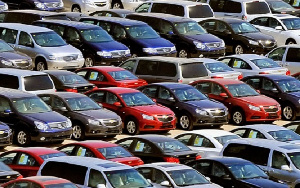Government commenced reversal on benchmarks on December 4, 2021
Reversal implies all imported vehicles are taxable
Stakeholders call on government to suspend reversal on benchmarks
Vehicle and Assets Dealers Union (VADN) has lamented government’s decision to reverse the discount on benchmark values of imported vehicles.
Speaking on Joy News, the General Secretary of VADN, Frank Atanley Kofigah, said since Ghana does not manufacture vehicles there was no need for the government to bring back the benchmark values for imported cars.
Benchmark value is the percentage of imported items which would be taxed and it is meant to encourage manufacturing of goods in Ghana.
The Benchmark value on vehicles was reduced by 30 percent but the reversal implies that 100 percent of imported vehicles are taxable.
The General Secretory of VADN questioned the rational for reversal by government since Ghana had no established automobile market.
“Do we manufacture vehicles in Ghana? If the government is looking at scrapping the 30% benchmark or bringing it back, the question I want to ask is to what good would that be? How will it help industrialization in terms of the automobile market? And how will government rake in the revenue desired to help that sector?” he quizzed.
Atanley Kofigah said instead of the government supporting businesses in the country, it was rather increasing their cost of doing business.
“Other countries are giving incentives and measures to industry and small scale and medium scale enterprises, to thrive, but what are we seeing? We are seeing a full blown 30% and 50% being reintroduced,” he said.
According to Atanley Kofigah, the VADN contributed 90 percent of imported vehicles which gave the government a lot of revenue.
“So, if we wake up one morning after Christmas holidays and government says that the implementation of such a policy takes effect immediately, the question we’re asking is in this era of COVID where patronage has been low before, during and after the holidays, is it the right time for government to roll out such a policy?
“The question is, was it a well thought out plan? A well thought out policy? And how can this help? Because if you ask me, I’ll tell you that the same business that the manufacturers or the assemblers are doing is the same business we are also doing, so why do you enrich them at our disadvantage?” he questioned.
 Home Of Ghana News Ghana News, Entertainment And More
Home Of Ghana News Ghana News, Entertainment And More





